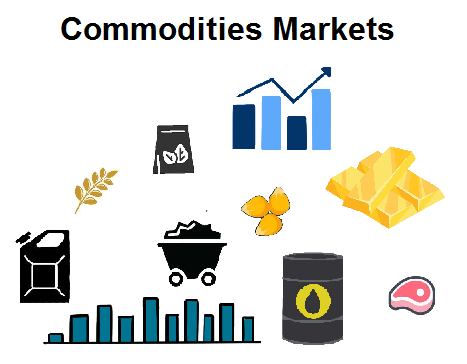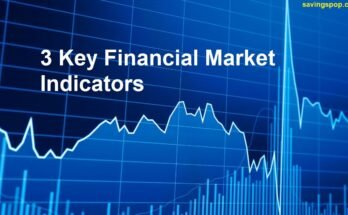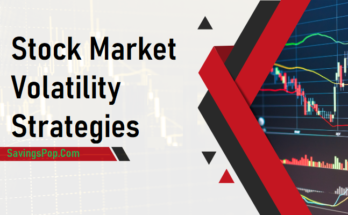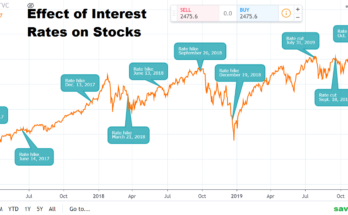Financial markets are just like the heartbeat of the worldwide economy. They offer a platform wherein consumers and dealers can alternate financial gadgets, including shares, bonds, commodities, and currencies. But what can we imply via the economic marketplace? Financial markets are very critical to understand because they play a vital role in the functioning of the global economy. They help companies raise capital, offer investment possibilities, permit chance control, and contribute to monetary increases. In this article, we will look at what are the four types of financial markets: stock markets, bond markets, commodities markets, and forex markets (foreign exchange).
What Are the Four Types of Financial Markets?
Financial Markets
Financial markets facilitate the purchasing and selling of economic belongings. These assets can include stocks, bonds, commodities, and currencies. By providing basic surroundings for those transactions, economic markets help allocate sources effectively, support funding and financial savings, and promote financial increase.
Financial Markets within the Economy
Financial markets are the spine of the economic system. They enable organizations to raise capital for expansion, governments to fund public tasks, and people to make investments and develop their wealth. By efficaciously allocating resources, those markets help make certain that money flows to wherein it can be most productive, riding innovation and monetary development.
Four Types of Financial Markets
In this newsletter, we’ll explore the four types of financial markets: stock markets, bond markets, commodities markets, and foreign exchange (the Forex market) markets. Each marketplace has its traits, mechanisms, and roles within the economic system.
1. Stock Markets

Definition and Purpose
Stock markets are venues where stocks of publicly traded groups are bought and bought. They permit corporations to elevate capital by way of issuing stocks to investors and provide a platform for traders to buy & sell possessions in those companies.
Stock Markets
Stock markets are essential for each group and trader. For groups, issuing inventory is a way to elevate cash without incurring debt. For buyers, shares offer the ability for growth and earnings via dividends and capital profits.
Stock Markets for Companies and Investors
Stock markets are vital for the liquidity and valuation of groups. They provide a manner for traders to buy into an agency’s destiny success and for businesses to benefit get admission to the funds needed for expansion and innovation.
Key Features
Public vs. Private Stocks
Public shares are traded on inventory exchanges and are to be had by any investor. Private shares, however, aren’t traded on public exchanges and are normally held by way of a smaller group of buyers.
Stock Exchanges (e.g., NYSE, NASDAQ)
Stock exchanges like the New York Stock Exchange (NYSE) and NASDAQ are in which stocks are indexed and traded. These exchanges provide a regulated and transparent environment for trading.
Market Capitalization and Types of Stocks (Common vs. Preferred)
Market capitalization refers to the total value of an enterprise’s terrific shares. Stocks can be categorized into commonplace and desired. Common stocks provide vote-casting rights and dividends, while favored shares normally provide constant dividends and have priority over common shares on the occasion of liquidation.
Must Read: Swing Trading Techniques Best Guide For Beginners
How Stock Markets Work
Initial Public Offering (IPO)
An IPO is when an enterprise first sells its shares to the general public. This process enables groups to raise substantial capital.
Buying and Selling Stocks
Investors purchase and promote shares through brokers or online buying and selling platforms. The inventory fee is determined with the aid of delivery and demand inside the market.
Brokers and Online Trading Platforms
Brokers act as intermediaries between consumers and sellers. Online trading systems have made it simpler for individual buyers to participate in the stock marketplace.
Benefits and Risks
Potential for High Returns
Stocks have the ability for excessive returns, making them attractive for funding. Successful agencies can see significant increases in inventory fees, presenting good-sized profits for investors.
Market Volatility and Risk Factors
Stock markets can be volatile, with prices fluctuating based totally on various factors, including financial information, the organization’s overall performance, and investor sentiment. This volatility can result in significant profits or losses.
Examples and Case Studies
Success Stories (e.g., Apple, Amazon)
Companies like Apple and Amazon have shown splendid boom, imparting sizeable returns to early traders.
Historical Crashes (e.g., the 2008 Financial Crisis)
The 2008 monetary disaster highlighted the risks related to stock markets, in which enormous declines can arise due to financial turmoil.
2. Bond Markets

Definition and Purpose
Bond markets are where debt securities, generally bonds, are issued and traded. These markets are vital for raising capital for governments and companies.
Bond Markets
Bonds are loans made by way of traders to issuers (typically governments or groups) in exchange for periodic hobby bills and the return of primary at adulthood.
Governments and Corporations
Governments use bonds to finance public tasks, at the same time as corporations use them to fund operations and growth. Bonds are a crucial source of solid, long-term funding.
Key Features
Types of Bonds (Government, Municipal, Corporate)
National governments, local governments, and companies all have their special bonds to offer. Different types of bonds have their own set of risks and rewards.
Bond Ratings and Credit Risk
Bonds get a rating from agencies like Moody’s and S&P, which tells us how risky they are. Safer bonds, like the ones with higher ratings, may not give you as much money, but they are less likely to lose value. On the other hand, riskier bonds, with lower ratings, can give you more money, but there’s a chance they might not be worth as much in the end.
How Bond Markets Work
Issuance of Bonds
Issuers promote bonds to buyers to elevate capital. The bond’s phrases, along with hobby rate and maturity date, are set at issuance.
Buying and Selling within the Secondary Market
After issuance, bonds may be sold and sold within the secondary market. Prices on this marketplace range based on hobby rates and the company’s creditworthiness.
Yield, Maturity, and Interest Rates
The bond yield is the go-back an investor receives on the bond. Maturity is the date when the important is repaid, and interest quotes impact the bond’s price and yield.
Benefits and Risks
Stability and Lower Risk
Bonds are commonly taken into consideration as safer than shares, offering greater strong returns and maintaining capital.
Interest Rate Risk and Default Risk
Interest price threat takes place when converting quotes affects bond costs. Default threat is the opportunity that the company may not repay the principal or hobby.
Examples and Case Studies
U.S. Treasury Bonds
U.S. Treasury bonds are considered one of the most secure investments, subsidized by using the U.S. Government.
Corporate Bond Successes and Failures
Successful company bonds, like those from blue-chip corporations, offer reliable returns. However, a few company bonds can fail, as seen in bankruptcies.
3. Commodities Markets

Definition and Purpose
Commodities markets are where raw materials or number one agricultural products are traded. These markets are vital for worldwide trade and economies.
Explanation of Commodities Markets
Commodities consist of energy (oil, fuel), metals (gold, silver), and agricultural products (wheat, corn). Trading commodities helps stabilize prices and ensure delivery and demand stability.
Global Trade and Economies
Commodities markets affect global trade and economies with the aid of influencing the expenses of crucial items. They additionally offer opportunities for hedging and investment.
Key Features
Types of Commodities (Energy, Metals, Agricultural Products)
Commodities are categorized into strength, metals, and agricultural products, every with precise buying and selling characteristics and market dynamics.
Futures Contracts and Spot Markets
Traders can trade commodities in futures contracts (agreements to buy/sell at a future date) or spot markets (immediate delivery).
How Commodities Markets Work
Trading Mechanisms (Futures, Options, Spot Trading)
Traders use diverse mechanisms to trade commodities. Standardized contracts are futures and alternatives, while immediate transactions include spot buying and selling.
Role of Exchanges (e.g., CME, NYMEX)
Exchanges like the Chicago Mercantile Exchange (CME) and New York Mercantile Exchange (NYMEX) offer platforms for commodities trading, ensuring transparency and law.
Benefits and Risks
Diversification and Hedging
Investing in commodities gives diversification and hedging towards inflation and monetary instability.
Price Volatility and Geopolitical Risks
Commodities expenses may be quite volatile, prompted by supply and call for, geopolitical events, and herbal screw-ups.
Examples and Case Studies
Oil Price Fluctuations
Oil costs are fantastically risky, stricken by geopolitical tensions and changes in delivery and call for.
Gold as a Safe-Haven Asset
Gold is regularly visible as a safe-haven asset, providing balance during monetary downturns.
4. Foreign Exchange Markets
Definition and Purpose
Traders trade currencies in the Forex marketplace. It is the most important and maximum liquid monetary market in the international, vital for global exchange and funding.
Explanation of the Forex market Markets
Forex markets allow the alternate of 1 foreign money for another, facilitating global change, investment, and tourism.
International Trade and Investment
Forex markets are critical for international trade, allowing corporations to transact in distinct currencies and manage change fee risk.
Key Features
Major Currency Pairs
Major forex pairs, inclusive of EUR/USD and USD/JPY, dominate Forex, representing the most traded currencies.
Forex Trading Platforms and Brokers
Platforms and brokers carry out forex trading, offering access to the market and providing tools for buying, selling, and analysis.
How Forex Markets Work
Spot Trading, Forward Contracts, and Options
the Forex market buying and selling includes spot buying and selling (immediately trade), forward contracts (destiny trade at agreed costs), and options (rights to exchange at a future date).
Factors Influencing Exchange Rates (Economic Data, Political Events)
Using economic facts (hobby quotes, inflation), political activities, and market sentiment influence exchange quotes.
Benefits and Risks
Liquidity and 24-Hour Trading
The Forex market offers high liquidity and operates 24 hours an afternoon, 5 days per week, permitting continuous buying and selling.
High Leverage and Potential for Significant Losses
The Forex market buying and selling frequently includes excessive leverage, amplifying both ability gains and losses.
Examples and Case Studies
Economic News on Currency Values
Economic information, consisting of employment reviews or hobby fee changes, can significantly affect foreign money values.
Famous the Forex Market Traders and Their Strategies
Notable the Forex market traders, like George Soros, have made widespread earnings through strategic buying and selling.
More Read: How Do Financial Markets Work?
Conclusion
Understanding the four types of financial markets, bonds, commodities, and forex- is important for all people interested in investing or economics. Each market offers specific opportunities and dangers, and diversifying investments throughout these markets can assist control threats and maximizing returns.
Tips for Getting Started in Each Market
- Stock Market: Start by way of studying companies and expertise market tendencies. Use online buying and selling systems for ease of access.
- Bond Market: Focus on bonds with excessive credit ratings and apprehend the effect of interest charges on bond charges.
- Commodities Market: Learn about the precise commodities you’re interested in and use futures contracts to hedge against fee adjustments.
- The Forex market Market: Gain a strong knowledge of global monetary signs and begin with a demo account to exercise trading strategies.
Encouragement to Diversify Investments Across Different Markets
Diversifying throughout extraordinary economic markets can help balance your portfolio, reduce hazards, and provide greater strong returns over time.
Additional Resources
For further studying, bear in mind those sources:
- Books: “The Intelligent Investor” by Benjamin Graham & “A Random Walk Down Wall Street” by Burton Malkiel.
- Courses: Online publications on Coursera or Udemy overlaying investment strategies and monetary markets.
- Financial Advisors: Consulting with monetary advisors can provide personalized investment strategies.




